Uncategorized
Saul Rubinek’s new one-man show asks, Is there ever a right time to play Shylock?
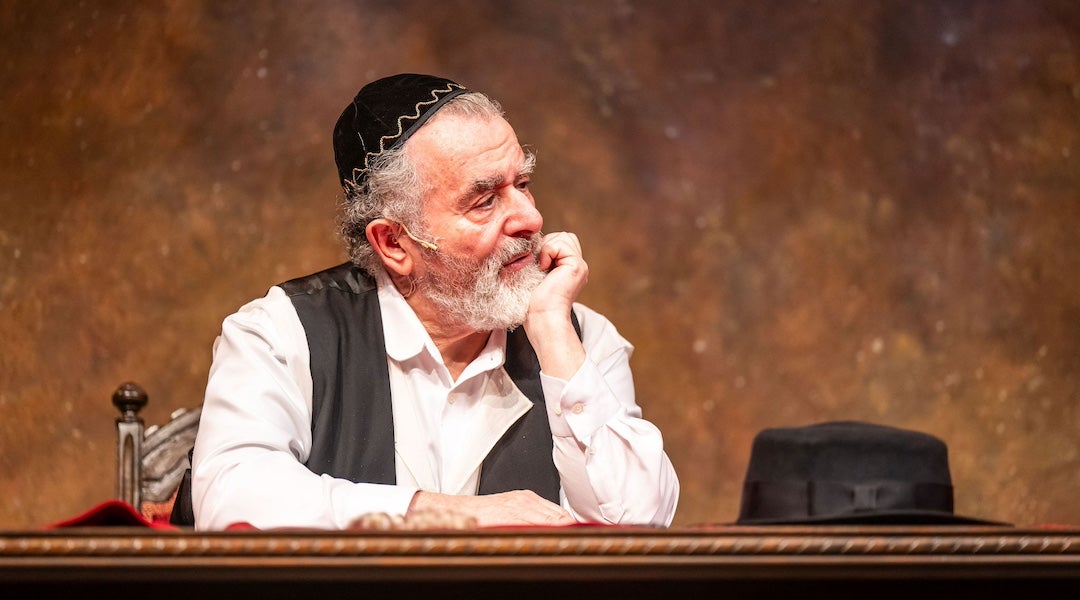
When Saul Rubinek walks on stage in “Playing Shylock,” he’s not only playing Shakespeare’s infamous Jew — he’s playing himself. Or rather, a version of himself: a Jewish actor furious that his production of “The Merchant of Venice” has just been canceled for being too controversial.
That conceit — a play about a play that’s been shut down, starring an actor playing a version of himself — is the brainchild of Canadian playwright Mark Leiren-Young, who wrote an earlier one-man show called “Shylock” three decades ago. During the pandemic, in collaboration with Rubinek, Leiren-Young reimagined the play, which opens Thursday at Brooklyn’s Polonsky Shakespeare Center after a critically acclaimed Toronto run.
“My character was ready to come on stage for three minutes,” Rubinek said in a joint interview with the playwright. “Saul Rubinek — the character — just wants to tell the audience that ‘Merchant’ has been canceled and they’ll get a refund. But he can’t leave the stage. He keeps talking. It’s all supposed to feel improvised — but 99.9 % is scripted.”
Over the next 100 minutes, Rubinek, a longtime character actor perhaps best known as Daphne’s mensch-y boyfriend Donny on the 1990s sitcom “Frazier,” delivers a primer on the history of Shakespeare’s most controversial play, a polemic against cancel culture and a meditation on Jewish identity and artistic heresy in the charged years after Oct. 7.
As Shylock — the Jewish moneylender who is scorned and humiliated by the Christian merchant to whom he lends 3,000 ducats under extraordinary terms — Rubinek, 77, wears the velvet kippah, tzitzit and long black coat of a modern-day haredi Jew. He recites some of Shylock’s best-known soliloquies — including “Hath not a Jew eyes,” an appeal to his tormentors’, and the audience’s, conscience — in an Eastern European accent.
Rubinek said he was imagining how his own father, a Holocaust survivor and one-time Yiddish actor who once dreamed of performing “Merchant,” might have played Shylock.
“That gave me the key to Shylock,” said Rubinek, who was born in a displaced persons camp in Germany after World War II, before his family immigrated to Canada. “I’m not really playing Shakespeare’s Jew. I’m playing how I imagine my father would have played him.”
That patrimony only fuels the outrage of the Rubinek character (henceforth called “Saul”) now that an unspecified social media campaign has intimidated the producers into shutting down the production.
The fictional cancellation echoes real-world controversies: In 2014, the Metropolitan Opera cancelled the international simulcast (although not the live performances) of John Adams’s “The Death of Klinghoffer,” about the 1985 hijacking of the passenger liner Achille Lauro by the Palestinian Liberation Front 2014. The producers’ cited concerns that the production could be used to fuel antisemitism.
Just last year, a Canadian theater cancelled a showing of “The Runner,” a play about an Orthodox man who piously collects body parts after terrorist attacks. The theater explained: “Given the current conflict in the Middle East, this is not the time for a play which may further tensions among our community.”
Jewish activists and the family of Klinghoffer, who was killed in the hijacking, put pressure on the Met; it’s not clear which members of the “community” sought to cancel “The Runner.” Similarly, “Playing Shylock” leaves vague who exactly objected to a new “Merchant,” although there’s a strong suggestion it was over-sensitive Jewish interests. Saul describes a grilling he got at “the Jewish community center,” where a Jewish moderator suggests that a play that centers an antisemitic archetype may be too “toxic” to perform.
Saul reacts with fury. “This? This play? With what’s happening? Right here? In this city?” he thunders. “Where you can’t go into a synagogue without passing armed guards — the real danger to ‘well-being’ is ‘Merchant’?”
Responding to a comically diplomatic press release from the theater saying it would be inappropriate to stage “Merchant” at “this time of rising antisemitism,” Saul scoffs.
“Has there ever been a time when antisemitism was not rising?” he says. “When, when was this magical time? Before or after Moses parted the Red Sea?”
Rubinek insists that “Playing Shylock” isn’t just another shot at woke culture, or a version of the dubious complaint by comedians that they can’t joke freely onstage without risking cancellation, or a dig at right-wing politicians and pundits who police what can and can’t be said about the assassination of Charlie Kirk.
“The show isn’t about the left or the right,” Rubinek said. “It’s not Fox News or woke protesters. ‘Merchant’ could have been canceled in 1936, in 1947, in 2016 — it’s always been a lightning rod. The question is, why do we keep trying to silence the art instead of confronting what makes us uncomfortable?”
When the show isn’t defending artistic freedom, it is probing Jewish identity. Saul complains about the number of gentile actors who have played Shylock, from Laurence Oliver to Al Pacino to Patrick Stewart, suggesting that Jewish actors have been overlooked in a misguided effort to downplay the character’s Jewishness. (Although, to be fair, the Jewish actor Henry Goodman was lauded for his turn as Shylock in a 1999 National Theatre production of “Merchant” that came to Broadway, and the Jewish actress Tracy-Ann Oberman starred as Shylock on London’s West End in 2022. Dustin Hoffman played the role in a 1989 London production that transferred to Broadway the following year.)
“In the play, I say I’m committing a kind of heresy,” Rubinek said. “By making Shylock visibly Jewish at a time of rising antisemitism, I’m accused of inciting hatred. But I think it’s the opposite — it’s reclaiming a Jewish story that’s been distorted for centuries.”
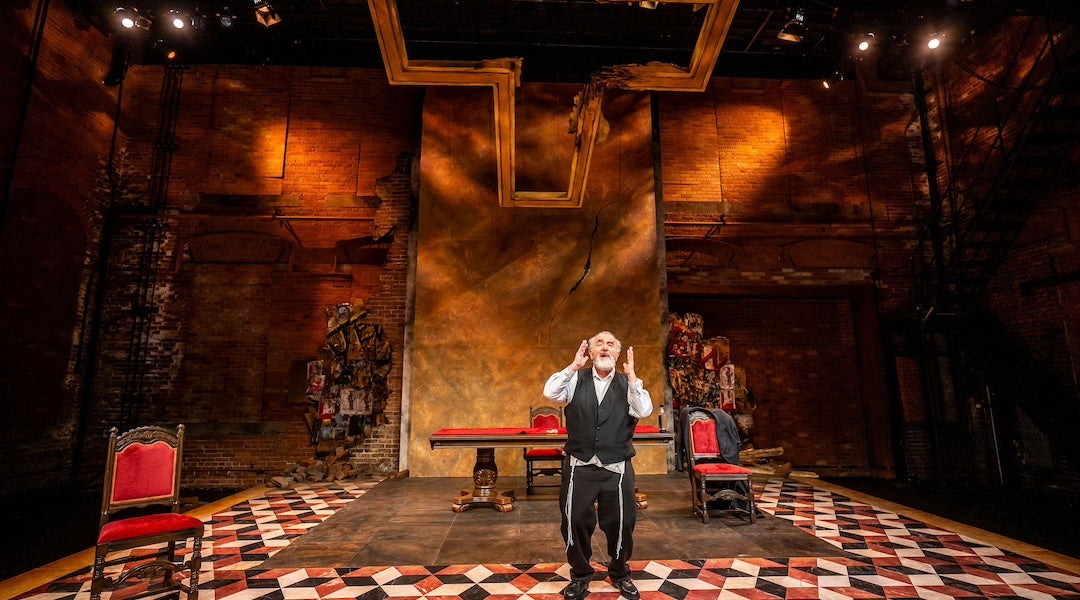
“You want to know why actors still do this play?” asked Saul Rubinek, shown on stage at at Brooklyn’s Polonsky Shakespeare Center. “Because Shylock is the first three-dimensional Jewish character in all of literature.” (Dahlia Katz)
For Leiren-Young, the collaboration offered a way to explore a lifelong fascination with censorship and identity. “It’s not just about who’s allowed to stage what,” he said. “It’s about who gets to tell their own story — and whether we still believe in the artist’s right to risk being misunderstood.”
Since the Oct. 7 attacks and the ensuing war in Gaza, Rubinek admits, staging a play about Jewish representation feels fraught. Yet the production, he said, seeks to hold both left- and right-wing audiences “in the same room, breathing together.”
“I’ve had people who see things completely differently — politically, emotionally — come up after and say they felt seen,” he said. “Because the play doesn’t lecture. It includes you in the fiction. You become part of the story.”
Ultimately, the play is a rousing defense of “Merchant,” allowing Rubinek to show off his acting chops — both in Shakespeare’s original language and in Yiddish. Rubinek has little patience for those — a roll call that includes the Jewish critic Harold Bloom and the British actress Judy Dench — who call “The Merchant of Venice” irredeemably antisemitic. Instead, he said, the play demands that audiences see a stereotype as a human being.
“You want to know why actors still do this play?” he asked. “Because Shylock is the first three-dimensional Jewish character in all of literature. Five scenes, and he’s haunted actors for 400 years. Why? Because he’s real.”
“Playing Shylock,” now in previews, opens Oct. 23 and runs through Dec. 7 at Polonsky Shakespeare Center, home of Theatre for a New Audience (262 Ashland Place, Brooklyn).
—
The post Saul Rubinek’s new one-man show asks, Is there ever a right time to play Shylock? appeared first on Jewish Telegraphic Agency.
Uncategorized
Young Americans increasingly likely to view Hamas as ‘resistance,’ not terrorists
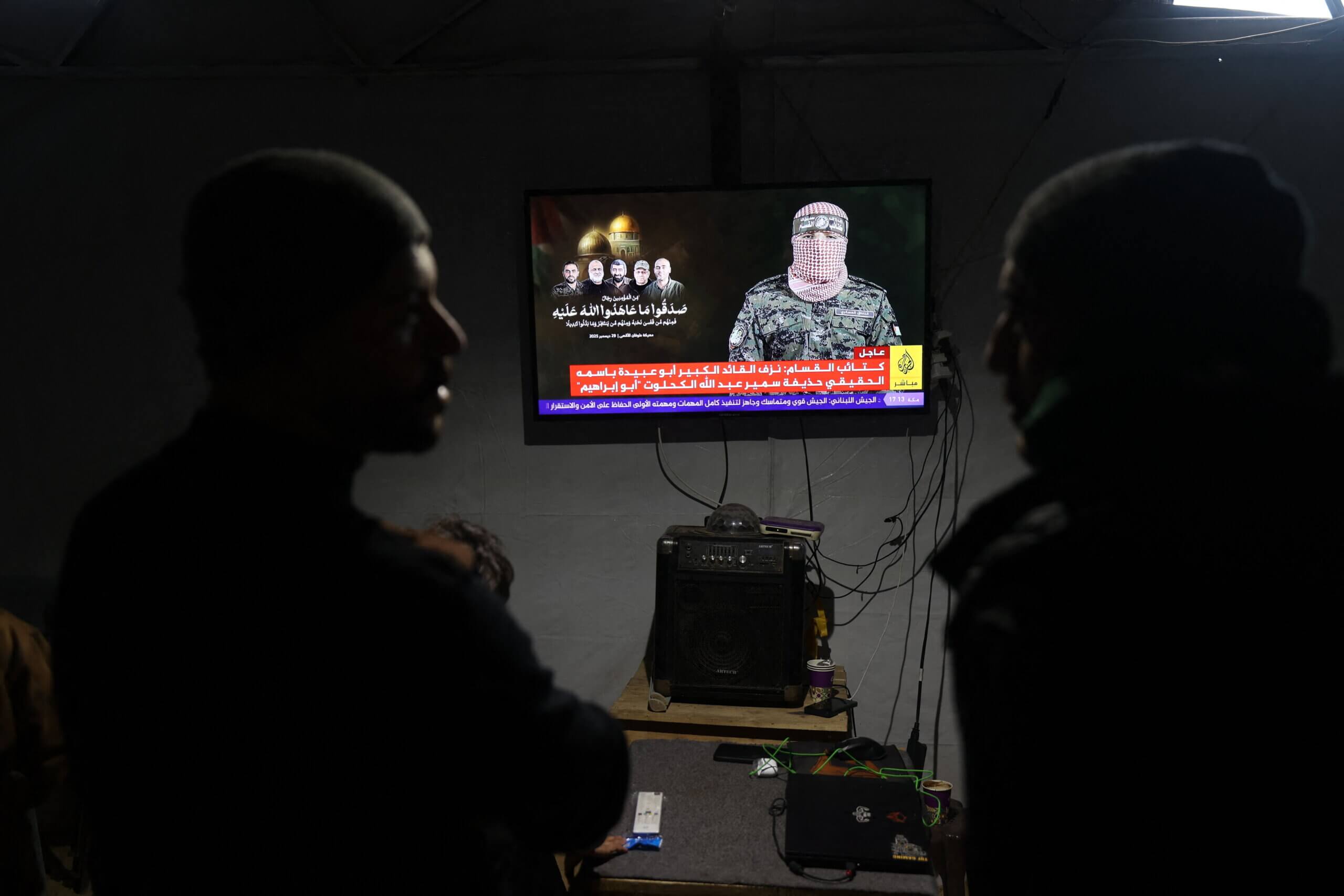
American adults under the age of 30 increasingly view Hamas as “militant resistance” operating on behalf of the Palestinian people, rather than a self-interested terrorist organization, according to data gathered by the American Jewish Committee.
In a poll conducted one year after the Oct. 7 Hamas attack against southern Israel, 33% of 18- to 29-year-olds described Hamas as a “resistance group” — nearly double the 17% of Americans over 30 who used that label — and that figure jumped to 43% this past fall.
The findings, shared with the Forward this month, track with another survey last summer that found 60% of 18- to 24-year-olds sided with Hamas over Israel in the Gaza war. It suggests the support that young Americans express for the Palestinians, and the same cohort’s deeply negative views toward Israel, are breaking through what was long a taboo: sympathy for an organization classified as a terrorist organization by the United States, and which has engaged in decades of violence against Israeli civilians.
Tariq Kenney-Shawa, a fellow at the pro-Palestinian think tank Al-Shabaka, attributed this shift to a broader disillusionment with mainstream media and the political establishment that has long presented Israel as a close U.S. ally with shared values.
“Americans have come to not trust these traditional narratives,” he said in an interview. “That spills over into thinking, ‘If we’ve been lied to about Israel’s true nature, maybe that means we’re also being lied to about Oct. 7 and groups like Hamas.’”
Open support for Hamas has been relatively rare among the protesters demonstrating against Israel’s prosecution of the war in Gaza. But constant demands for activists to condemn Hamas after Oct. 7 quickly became a source of derision on the left, while slogans and iconography celebrating Hamas violence became more common as the conflict dragged on and Israel killed tens of thousands of Palestinians, destroyed the vast majority of Gaza’s infrastructure and restricted aid shipments as experts warned of famine and raised the specter of genocide.
But many Jewish leaders and other critics of Hamas say young people are misinformed about the nature of Hamas — including its lukewarm support among Palestinians living in Gaza — and the war.
They also say apparent support for Hamas, especially in a public opinion poll that offers limited response options, may be less about genuine support for the organization and its political platform and more about picking the answer that aligns with their support for Palestinians.
“There’s a tendency in our very polarized society to find a camp and stay in the camp and whatever words the camp is using become your words,” said Julie Fishman Rayman, vice president for policy at the American Jewish Committee.
Complex — and incomplete — views on Hamas
In the immediate aftermath of Oct. 7, a core of activists sympathetic to Hamas made their presence known. Demonstrations in major cities celebrated the attacks, while the coordinating body of Students for Justice in Palestine approvingly referred to Hamas militants as “the resistance.”
But as a broader protest movement calling for an immediate ceasefire in Gaza grew — drawing in Jews and others who simultaneously condemned Hamas violence on Oct. 7 and called for Israeli hostages to be released — some leading Jewish organizations and pundits continued to paint the demonstrators as terror supporters.
What data was available painted a more complex picture.
A study conducted by Eitan Hersh, a Tufts University professor, found that 5% of self-identified leftist college students — those who were generally organizing and participating in the campus protests against Israel — believed that “all Israeli civilians should be considered legitimate targets for Hamas,” compared to 17% of conservative students.
And since the Israel-Hamas war began, the Harvard/Harris poll, a collaboration between the school’s Center for American Political Studies and a private polling firm, has consistently found that between 40% and 50% of the youngest American adults — those aged 18 to 24 years old — side with Hamas over Israel when forced to choose. The monthly poll’s August edition made headlines when that figure briefly jumped to 60% support for Hamas.
A member of the Democratic Socialists of America’s New York City chapter pointed to that statistic while pressing Shahana Hanif, a progressive member of city council, during an endorsement meeting on why she had condemned local protesters who had chanted in favor of Hamas.“With 60% of Gen Z supporting Hamas against Israel, many of us are realizing now that we’ve been lied to all our lives,” the person said, according to a recording obtained by Jewish Insider. (A NYC-DSA spokesperson said that members do not reflect the organization’s position.)
But most coverage overlooked the poll’s other findings, including that 61% of that age group believed “Hamas must release all remaining hostages without any conditions or face serious consequences” and that 63% disapproved of Hamas’s conduct in the war.
The Harvard/Harris survey has been criticized for being unreliable and at times producing results about antisemitism and the Israeli-Palestinian conflict that are “bizarre and difficult to account for,” in the words of a Harvard Crimson columnist.
But some observers say that people expressing sympathy for Hamas may have nuanced views.
“I speak to a lot of Palestinians who have supported Hamas not because they support terrorism but because they support action to oppose the occupation,” said Roei Eisenberg, chair of the young adults network at Israel Policy Forum, a dovish Zionist think tank. “They have a Palestinian Authority that’s broken and corrupt and not actually standing up for them — and they see Hamas in Gaza at least putting up a fight.”
Ahmed Moor, a Palestinian-American writer and fellow at the Foundation for Middle East Peace, said that supporters of the Palestinians in the United States are following a similar logic as they see evidence of devastation and Israeli brutality in Gaza. “Why are Zionists so resistant to the idea of Palestinian resistance?” he asked. “Any normal person would look and say, ‘Of course these people have a right to resist.’”
That sentiment has circulated on social media, often among anonymous creators.
After Israel killed Yahwa Sinwar, the military leader of Hamas in Gaza, many users on TikTok created videos praising the bravery of his final moments in which he is recorded throwing a stick at an Israeli drone.
“In a million years, you would never see Joe Biden, you would never see Ben-Gvir, you would never see any of these people die for anyone but themselves,” a Jewish user who goes by Dirty Alex told his 23,000 followers.
He added an ambivalent caveat: “It’s weird because I think — because of Oct. 7, the people who perpetuated it should be held accountable — and I think they would agree, actually — but at the same time I will always support righteous struggle.”
That tendency to equivocate when it comes to Hamas’s most egregious atrocities is common even among those in the U.S. who otherwise express support for the group. Many have sought to downplay the Oct. 7 attack as primarily an assault on Israeli military positions and claiming that atrocities committed against civilians were exaggerated or completely fabricated.
On social media, many users have rushed to highlight any evidence that Israeli hostages were treated well by Hamas during captivity. For example, several large accounts claimed that Israeli Maya “Bengi” had refused to meet with Israeli Prime Minister Benjamin Netanyahu because his “hands are stained with the blood of children in Gaza.”
But the real hostage, named Maya Regev, did meet with Netanyahu and said she had been abused by sadistic doctors in Gaza.
The most popular symbol associated with Hamas among Israel’s opponents in the U.S. is also connected with attacks on the Israeli military rather than civilians: The inverted triangle, which comes from grainy propaganda videos that use the red arrow to point out Israeli military units operating in Gaza immediately before Hamas militants fire at them.
Kenney-Shawa, the Al-Shabaka fellow, said the growing support for Hamas among young Americans suggests that “more people are vibing with the idea of Palestinian resistance” rather than aligning with the organization’s specific tactics or policies.
Others acknowledge that while Hamas has engaged in war crimes and violations of international law, Israel stands accused of engaging in similar behavior. “Palestinian resistance has always been armed — and that’s always been in line with international law — and the violation of international law has also occurred both by Zionist groups and Palestinians,” Moor said. “Everyone has committed crimes.”
Hamas officials have also sought to present positions to western audiences that are palatable to progressives, emphasizing measured political positions and portraying Israel as the more radical and intransigent party.
“We are politically realistic,” Khaled Meshaal, a senior Hamas leader, told Drop Site News in December. “We are ready to engage with any serious project to establish a Palestinian state along the 1967 borders even though I realize, unfortunately, that this is impossible because of Israeli policy.”
Hamas as symbol of resistance
Hamas coming to represent the strongest resistance to Israel among young people in the U.S. is frustrating for some Palestinians, who say it sanitizes what Hamas actually represents and overlooks the preferences of Palestinians in Gaza.
Khalil Sayegh, a politician analyst and director of the Agora Initiative, which advocates for Palestinian rights in Israel, the West Bank and Gaza, said he appreciated that Americans were turning away from an uncritical pro-Israel narrative but worried about polarization in the opposite direction.
“Resistance has become basically equal to Hamas and Hamas equal to resistance,” Sayegh said. “That’s a very toxic and wrong thing.”
He said that “Israeli apartheid and genocide” was the main problem in Gaza but that Hamas also stood in the way of establishing a “secular, democratic Palestine.”
While around half of Palestinians in Gaza said they were satisfied with Hamas’s performance in the war, according to an October survey, the poll also suggested that the organization would be soundly defeated if open parliamentary or presidential elections were held across the West Bank and Gaza.
Around 33% of voters in Gaza would support a Hamas candidate for president, while most of the remainder would either vote for Marwan Barghouti, a leader of secular rival Fatah who is currently imprisoned by Israel, or not participate, according to Palestinian Center for Policy and Survey Research. Respondents were roughly split on whether negotiations and peaceful protest or “armed struggle” were the best method to establish a Palestinian state.
Throughout the 1980s and 1990s there were robust debates in the Palestinian diaspora over which political factions to support. But Sayegh said those faded from public view as Israel eliminated most credible alternatives and fears grew that open critique of Hamas would be weaponized by pro-Israel groups to weaken the pro-Palestinian movement.
Additionally, he said, activists in the U.S. who support Hamas have intimidated its critics within the Palestinian community. “There is still a debate but there is no public debate,” Sayegh said. “The masses that are supportive of Hamas have scared the people who oppose Hamas into silence.”
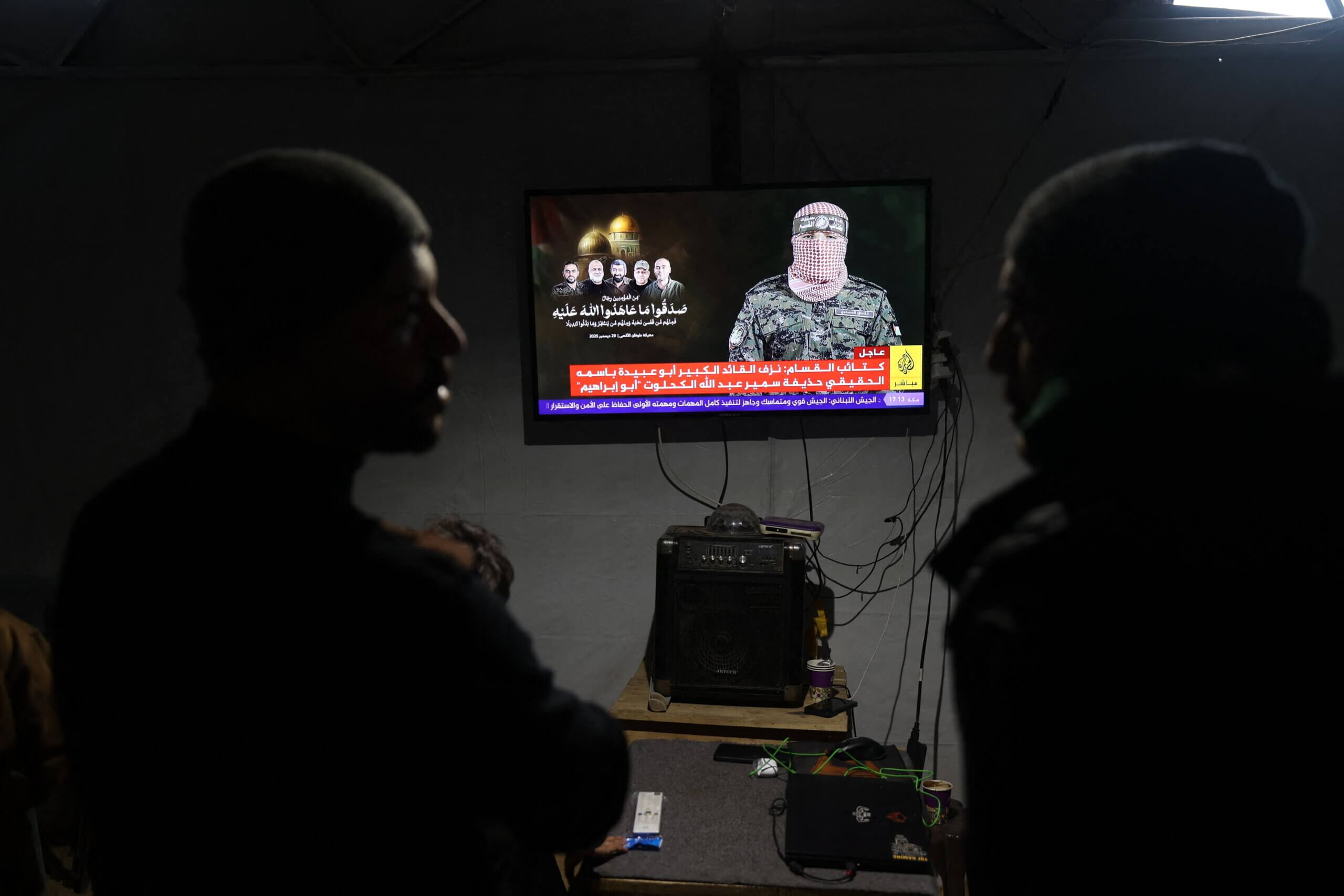
Ahmed Foud Alkhabtib, who moved from Gaza to the U.S. in high school, has become one of the most prominent Palestinian critics of Hamas and now positions himself in opposition to most of the pro-Palestinian movement.
Alkhabtib, the founder of an initiative called Realign for Palestine at the Atlantic Council, attributed the rise in support for Hamas to a combination of ignorance and malice within the “pro-Palestine industrial complex” composed of “far-left meets far-right meets the Islamists meets the Taliban and al-Qaeda meets the idiot Jewish kids who said they were lied to about Israel at summer camp.”
But he said that some Palestinians had told him during the war that they shared his antipathy toward Hamas — especially as some blamed the group for contributing to aid shortages over the summer — but that they would speak out once Israel ended its military operations. “I did pick up on notes of the pro-Hamas euphoria dying down,” Alkhabtib said.
And yet both Palestinian and Jewish observers said that leading pro-Israel organizations have also contributed to polarization around the Israeli-Palestinian conflict that drives some people toward Hamas or makes them reluctnat to criticize the group.
Eisenberg, with the Israel Policy Forum, said that many Jewish groups have refused to acknowledge Israeli atrocities in Gaza and rushed to paint the country’s critics as terror supporters. “It’s coming from a place of being unable to hold complexity,” he said.
Alkhabtib said he has experienced this firsthand. Despite being an unequivocal critic of Hamas and maintaining close ties to many Jewish organizations, he has found little tolerance for also critiquing the Israeli far right.
“The pro-Palestinian people are watching me — the pro-Hamas people are watching me — and saying, ‘Well what incentive do I have if you’re been Mr. Dialogue and Engagement and they turn on you the second you criticize Israel,” Alkhabtib said. “There’s something to be said about the role of Jewish communities to reverse these problematic trends.”
The post Young Americans increasingly likely to view Hamas as ‘resistance,’ not terrorists appeared first on The Forward.
Uncategorized
At Berlin screening, former Israeli hostages see film about their captivity rewritten after redemption
(JTA) — BERLIN — They stood outside Berlin’s Babylon theater, bundled against the cold, laughing and dragging on cigarettes: the Cunio twins David and Eitan, and their younger brother Ariel.
David and Ariel were among the last Israeli hostages released in October from Hamas captivity, after 738 days. Their presence in Berlin — for a screening of a film about them, now recut with a redemptive ending — felt almost like an apparition. On the other side of two heavy glass doors were hundreds of theatergoers, people who had long waited for this moment.
The brothers and their extended family were in Berlin for a second premiere of Tom Shoval’s film “Letter to David.” The original film, shown in 2025 at the Berlin International Film Festival, or Berlinale, dove deep into the struggles of a family whose members had been abducted from Kibbutz Nir Oz on Oct. 7, 2023. By then, six kidnapped members of the family, including three children, had been freed. But David and Ariel remained in captivity.
“Last year I was standing before the screening with a poster of David and Ariel. I was determined, every time I showed the film, to say that it’s an unfinished film,” Shoval told the sold-out audience at the theater in former East Berlin.
“And now I’m standing here. I have David in the audience, and I have Ariel in the audience,” he continued. “This is a precious, precious moment.”
The film “is a testament to love, hope and all the people who did not give up during the two years I was in captivity,” David Cunio said in Hebrew, standing on the stage with his extended family. “You gave me a voice when I could not be present. You were there for me.”
The film’s second showing came as tensions over the war in Gaza and Germany’s support for Israel roiled the Berlinale. After the jury’s president, director Wim Wenders, brushed off a journalist’s exhortation for the festival to take a stand against Israel, the Indian author Arundhati Roy announced she would not attend, and some 80 filmmakers and stars signed an open letter of protest.
Festival director Tricia Tuttle issued a statement saying that “artists should not be expected to comment on all broader debates about a festival’s previous or current practices over which they have no control. Nor should they be expected to speak on every political issue raised to them unless they want to.”
Journalists and filmmakers continued to raise the issue, even on the festival’s final weekend, when some award winners — including the Syrian-Palestinian director Abdullah Al-Khatib, who won best debut film — swatted back at the festival jury, criticizing what they see as Germany’s general support for Israel. Al-Khatib’s allegation that Germany has been “partners in the genocide in Gaza by Israel” prompted a German minister to walk out of the awards ceremony on Sunday.
Friday’s screening of “Letter to David” was by contrast a love fest, and the two police cars out front and uniformed officers circulating inside appeared to have little to do. The audience gave the entire family a standing ovation before the screening.
“I think this is a piece of history,” audience member Nirit Bialer, an Israeli who has lived for years in Berlin, said in an interview. “Just seeing the family, and just following the story about this family on the media, going to the Hostages Square in Israel every time I was there in the last two years: Wow, I’m speechless.”
The film’s original ending showed twins David and Eitan Cunio as actors, grappling with each other in an embrace that is both tender and violent, in a scene from Shoval’s feature film, “Youth,” screened at the Berlinale in 2013.
That ending now segues into a new conclusion, in which the reunited Cunio family embraces. They also view the film together, and Shoval captures their faces as the projector beams from behind.
Shoval said in an interview that he had not changed anything in the first part of the film. “I wanted to leave it as a time capsule, in a way, of how we perceived it back a year ago,” he said.
Though he had been invited to be with the family at their reunion, he chose not to, explaining, “I thought it’s a moment that belongs to them and not to me.”
But he spoke with David soon after he was released. And shortly afterward, he visited Sharon and David Cunio at their home. “I came in the morning and we sat until sunset together and we talked. Even when I’m thinking about it now, I’m getting emotional, because it was really…” He paused. “You’re waiting for a moment for this for so long.”
The Friday screening was not an official part of the Berlinale, but the beleaguered festival director Tuttle made a point of taking the stage herself. The film has been “finished in the way that Tom only hoped and dreamed and believed that he would be able to finish it,” she told the audience.
“We were horrified along with the world and all of you when David Cunio and many members of his family were abducted by Hamas,” she said. And on their release “we rejoiced with everyone as well.”
Saying that the new version was completed too late to be included in the festival schedule, Tuttle thanked two co-production companies that work closely with Israeli artists for backing Friday’s screening: the Israel-based Green Productions and the Berlin-based Future Narrative Fund.
Audience members seemed loath to leave the theater after the screening, lingering over what some described as mix of happiness and worry.
“The fact that David is able to see the movie makes us see the movie in a different way,” commented Konstantin, who had seen the original version last year. A young Jewish actor who lives in Berlin, he asked that his full name not be used, out of concerns about antisemitism. “With the ending, it’s like a full circle, completed.”
Seeing the film again with the Cunio family present “was very uplifting and very happy,” said Berliner Julia Kopp, who also saw the film last year. “But at the same time, it’s not a happy ending … I also have a bit of a heavy heart,” worrying about “how life will go on for them.”
Both brothers have indicated that reentry into everyday life has been challenging after two years of captivity for them and two years of traumatized advocacy by their loved ones. And Ariel Cunio and his partner Arbel Yehud, who was held in captivity until January, have raised nearly $1.8 million since launching a crowdfunding campaign last week aimed at allowing them the time and space to “come back to life.”
A crowdfunding campaign launched on behalf of David and Sharon Cunio their twin daughters, also former hostages, says, “The family not only has to deal with the trauma that follows being held hostage and the events that transpired on October 7th, but also needs to rebuild their entire lives from scratch.”
Shoval said the film — and the screening — offered a vision for what a more settled future might look like.
“For me, the film is about the unification of the brotherhood, and what that means to be torn apart from each other, but also to get back,” Shoval said. “They can sit in the theater and they can see themselves. They can see what they missed, what happened. They can project about the past, about the present. This is a power of cinema, I feel. It felt natural for me to do that: to bring them back.”
The post At Berlin screening, former Israeli hostages see film about their captivity rewritten after redemption appeared first on The Forward.
Uncategorized
He may have been the world’s most famous mime, but in this play, he won’t shut up
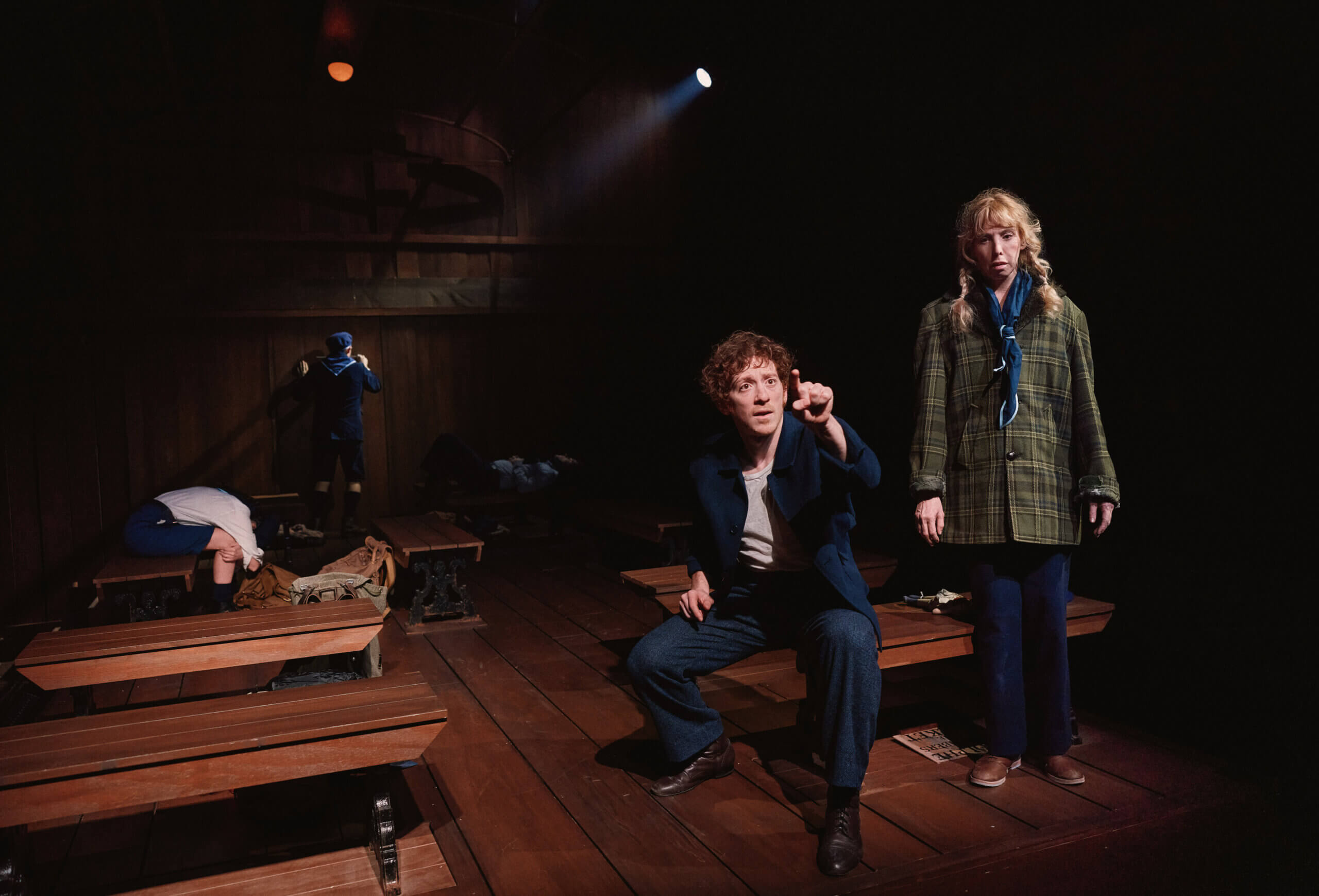
There is a kind of sublime poetry in Marcel Marceau’s first act.
As a young man in occupied France, Marceau (then Mangel) forged identity papers and shepherded dozens of Jewish children across the Alps to Switzerland. In scenarios where staying quiet was essential for survival, Marceau soothed his charges into silence with his own.
In Marcel on the Train, Ethan Slater and Marshall Pailet’s play of Marceau’s pre-Bip life, the world’s most famous mime is anything but silent.
The action of the play, which bounces through time back to Marcel’s father’s butcher shop and forward to a P.O.W. camp in Vietnam (don’t ask), unfolds over the course of a train ride. Slater’s Marceau is chaperoning four 12-year-old orphans, posing as boy scouts going on a hike.
The kids — played by adults — are a rambunctious lot. Marceau tries to put them at ease juggling invisible swords, performing Buster Keaton-esque pratfalls and exhausting his arsenal of Jewish jokes that circle stereotypes of Jewish mothers or, in one case, a certain mercenary business sense.
Pailet and Slater’s script toggles uncomfortably between poignancy and one-liners with a trickle of bathroom humor (the phrase “pee bucket” recurs more often than you would think.)
The terror of Marceau’s most melancholy escortee, Berthe (Tedra Millan) is undercut somewhat by her early, anachronistic-feeling declaration, “Wow, we’re so fucked.” The bumptious Henri (Alex Wyse) would seem to be probing a troubled relationship with Jewishness and passing, but does that discussion a disservice when he mentions how it wouldn’t be the biggest deal if he “sieged a little heil.” Adolphe (Max Gordon Moore) is described as “an exercise in righteousness” in the script’s character breakdown. Sure, let’s go with that.
The presence of a mute child, Etiennette (Maddie Corman), is tropey and obvious. It doesn’t suggest that she inspired him to abandon speaking in his performances, but it doesn’t dismiss that possibility either.
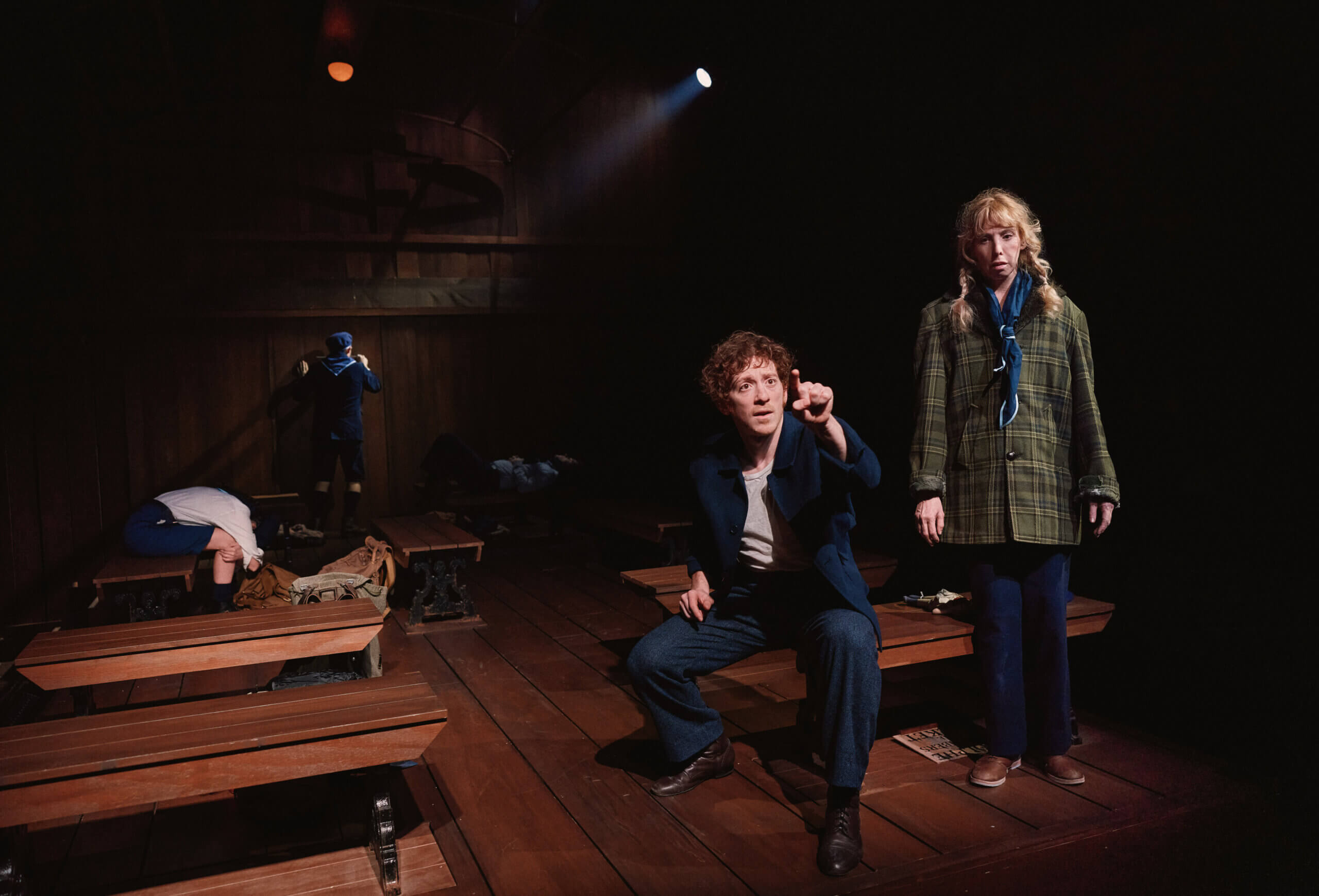
But the chattiness and contrived functions of the fictive children are made more disappointing by the imaginative staging maneuvering around the shtick. Slater, best known for his role in the Wicked films and as Spongebob in the titular Broadway musical, is a gifted physical performer.
When things quiet down, Pailet’s direction, and the spare set by scenic designer Scott Davis, create meadows of butterflies. Chalk allows Marceau to achieve a kind of practical magic when he writes on the fourth wall. One of the greatest tricks up the show’s sleeve is Aaron Serotsky who plays everyone from Marceau’s father and his cousin Georges to that familiar form of Nazi who takes his torturous time in sniffing out Jews.
Surely the play means to contrast silence and sound (sound design is by Jill BC Du Boff), but I couldn’t help but wonder what this might have looked like as a pantomime.
While the story has been told before, perhaps most notably in the 2020 film Resistance with Jesse Eisenberg, Slater and Pailet were right to realize its inherent stage potential. It’s realized to a point, though their approach at times leans into broad comedy that misunderstands the sensibilities of its subject.
Like Slater, who learned of the mime’s story just a few years ago, Marceau was an early acolyte of Keaton and Chaplin. But by most accounts he cut a more controlled figure — that of a budding artist, not a kid workshopping Borscht Belt bits on preteens.
The show ends with a bittersweet montage of Bip capturing butterflies (not jellyfish — you will probably not be reminded of Mr. Squarepants). It means to frame Marceau’s established style as a maturation that nonetheless retains a kind of innocence, stamped by the kids he rescued.
“You’ll live,” Berthe tells him in a moment of uncertainty. “But I don’t think you’ll grow up.”
In Marceau there was, of course, a kind of Peter Pan. But there’s a difference between being childlike and being sophomoric.
Marcel on the Train is playing through March 26 at Classic Stage Company in New York. Tickets and more information can be found here.
The post He may have been the world’s most famous mime, but in this play, he won’t shut up appeared first on The Forward.


